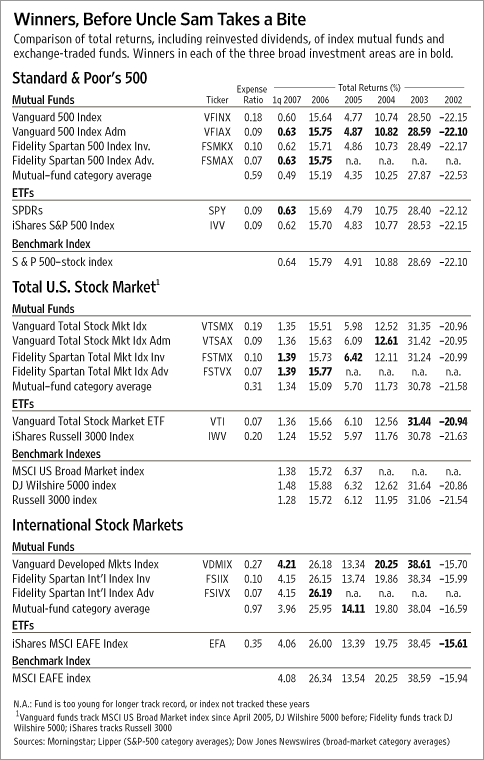The Differences Between ETFs And Mutual Funds
Post on: 6 Август, 2015 No Comment

ETF’s are like anti-lock brakes: they’re everywhere, most people know generally what they do, but I doubt the average person could explain them in any great detail. When I talk to people, I get the sense that most think about ETF’s and mutual funds interchangeably. They’re right in spirit but wrong on the details.
Let’s try to hone in on a clearer definition of ETF’s. The acronym stands for Exchange Traded Funds, but instead of continuing on with dry definitions, let’s look at them through the lens of an investor who has some cash and is desperate to buy a piece of the stock market.
This investor doesn’t know much about investing, but she knows she wants to buy a big, diverse slice of the stock market. She’s heard good things about Vanguard’s Total Stock Market Index; a friend told her about its low expense ratio and staggeringly diverse holdings. How does she go about buying into something like this?
The most obvious way is for her to log onto the Vanguard webpage and open an account. With a Vanguard account, she can link up to her bank account and buy the Vanguard Total Stock Market Index Mutual fund (ticker: VTSAX) with zero commissions or brokerage fees. Our savvy investor will never pay any fees beyond the yearly expense ratio of .17% (.05% for balances of $10,000 or more). Sounds easy enough, and it is.
But there are some catches. First, even though VTSAX is trading at around $50 per share as of this writing, our investor actually needs $3,000. This is because Vanguard requires a minimum initial balance of $3,000 to open a Vanguard mutual fund account. And once her money enters Vanguard, it will tend to stay invested in Vanguard products. It’s possible to purchase stocks on the open market through a Vanguard account, but it is neither the cheapest nor easiest place to do so. Think of mutual fund companies like smartphone operating systems. Once you choose one, such as Apple’s iOS, you’re trapped inside its walled garden, verdant as it may be.
ETFs, on the other hand, live outside of the walled garden. If she wanted, our investor could eschew Vanguard and open a regular brokerage account with a company like Sharebuilder or E*Trade. From there she could purchase the Vanguard Total Stock Market ETF (ticker: VTI). This is in essence the same investment, with a similarly low expense ratio. However, it can be purchased on the open market – a mutual fund investment that acts like a stock. Like with a stock, the investor can purchase as little as she wants – there is no minimum. For this privilege, she’ll pay a brokerage fee, usually between $5-15 per trade.
The differences continue when our investor wants to sell. The Vanguard ETF will incur another brokerage fee when sold, but the transaction processes instantaneously. With the Vanguard Mutual fund, there are no transaction fees, but the sale doesn’t go through until the end of the day. In this way, ETF’s offer more precision in buying and selling – again, like stocks. And like stocks, an investor can short an ETF or buy on margin. The reality, however, is that a majority of fund holders are not buying and selling frequency, nor are they using complex investment tricks, so these perks benefit few.
There are mutual funds for nearly every sector of investment conceivable, as well as for hard commodities like gold or wheat. Investors that don’t want to throw their lot in with a mutual fund company can find a similarly described ETF and purchase a similar product through a brokerage firm.
There’s a reason people speak about mutual funds and ETFs in the same sentence. On the whole, they both allow access to markets without needing to purchase individual stocks, bonds or commodities. They are more alike than different, and while it’s important to know which works best for you, it’s more important to know that they will both work, period.
The views expressed herein are not intended to serve as a forecast, a guarantee of future results, investment recommendations or an offer to buy or sell securities by FutureAdvisor. Differences in account size, timing of transactions and market conditions prevailing at the time of investment may lead to different results, and clients may lose money. Past performance is not indicative of future results.
E.A. Mann














